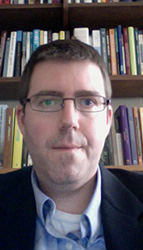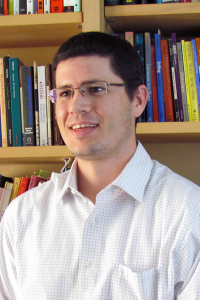

The DRC’s Hack & Yack series is excited to welcome guest contributors Justin Hodgson and Scot Barnett, co-coordinators of the Indiana Digital Rhetoric Symposium. In anticipation of the inaugural symposium, which takes place this week, Hodgson and Barnett share some thoughts on the conference’s beginnings as well what they hope it might accomplish. This is the first of a series of Hack & Yack posts dedicated to the symposium. Stay tuned for session reviews and a follow-up post from Hodgson and Barnett next week.
Introducing the Indiana Digital Rhetoric Symposium
This week (4/9-4/11), Indiana University Bloomington will host the first ever Indiana Digital Rhetoric Symposium. As co-coordinators of this event, our goal was to create a setting in which established and emerging scholars could critically explore the implications, possibilities, and gradations of digital rhetoric. We felt there was such an array of perspectives and definitions of digital rhetoric (our symposium theme) that we wanted to create a space for fostering conversations at the intersections of rhetoric, media, and technology and to investigate the ways in which digital rhetoric connects to, yet is distinct from, Digital Humanities.
Of course, “digital rhetoric” has been in circulation for some time now, but the term has proliferated in recent years, further suggesting a need to reassess the relationships between digital media and rhetorical studies. As one example, in 2013 we were both hired for a position at IU in “Digital Rhetorics.” At the time we applied for this position in 2012, there were exactly two mentions of “digital rhetoric” in the MLA Job Information List (including our eventual position at Indiana). Of course, even while digital rhetoric was nearly absent in that year’s JIL, many positions called for specialists in “multimodal composing,” “digital writing,” “new media studies,” “digital media,” “digital humanities,” “computers and composition,” and “computers and writing.” Now in contrast, a quick survey of this year’s JIL tells a somewhat different story. Though positions in digital writing and DH continue to show increases, this year there were at least 23 positions that specifically named “digital rhetoric” as one of their desired specialties. The exponential increase in the term digital rhetoric—as well as the variations in nomenclature surrounding digital media generally—reflect a number of issues, some disciplinary, others institutional. But the question worth asking—and to which the IDRS serves as a response—is what exactly we mean by “digital rhetoric.” How is digital rhetoric different from digital writing or Digital Humanities, if indeed it is different at all? Or, more to the point, what is rhetorical about digital rhetoric?

At the IDRS this week, scholars will begin to explore these and other questions related to the study and practice of digital rhetoric today. Some presenters will explore digital rhetoric’s connections to Digital Humanities (both in the popular sense of digital humanities being everything that fits under the heading of “digital + humanities” as well as digital humanities’ specific roots in humanities computing). Others will engage in conversations about digital rhetoric and its relations to established and emerging communication practices in an age of mobile and ubiquitous computing. And yet others will explore how digital rhetoric may help develop and lead new humanities curricula for the 21st century—picking up and extending Richard Lanham’s call almost twenty years ago. Some will focus on code, some on mathematics, some on civic engagement, and others on pedagogy, methodology, and digital production. As coordinators, we actively welcomed this array of perspectives and approaches. In fact, the research presented will draw upon such a wide range of practices and disciplines—from programming (e.g., politics and aesthetics of code) to philosophy (e.g., object oriented ontology), from media studies (e.g., immediacy, hypermediacy, and eversion) to ethnography (e.g., rhetorical practices and digital representation)—that we will likely leave with more perspectives than definitions. But that’s kind of perfect as that is where the field is at this moment.
Ultimately, we hope the IDRS introduces (or exposes) a number of pressing issues for digital rhetoric going forward, including methods of invention and analysis (heuretics vs. hermeneutics), human and nonhuman agents and audiences, material vs. digital constructions (and their problematic nature), and the sometimes inconsistent epistemologies, ideologies, and ontologies presently influencing the development of digital rhetoric. In bringing together such an impressive group of scholars in the field, we look to establish (and challenge) the boundaries of digital rhetoric and to create a moment marking the second resurgence of rhetoric in the modern age.
Additional information about the IDRS, including the program and list of speakers, can be found on our website: http://idrs.indiana.edu/.
Also, IDRS presentations, including both keynote addresses, will be live streamed at http://idrs.indiana.edu/program/livefeed.shtml (archived presentations will be available shortly after the event). [Note: all presentation times are Eastern Standard Time.] Further, the Rhetoric Society of America, in conjunction with the IU graduate student chapter of the RSA, is sponsoring Collin Gifford Brooke’s closing keynote, “Cognition in the Wild(fire): Digital Rhetoric and Peak Virality,” as its annual Webinar.
